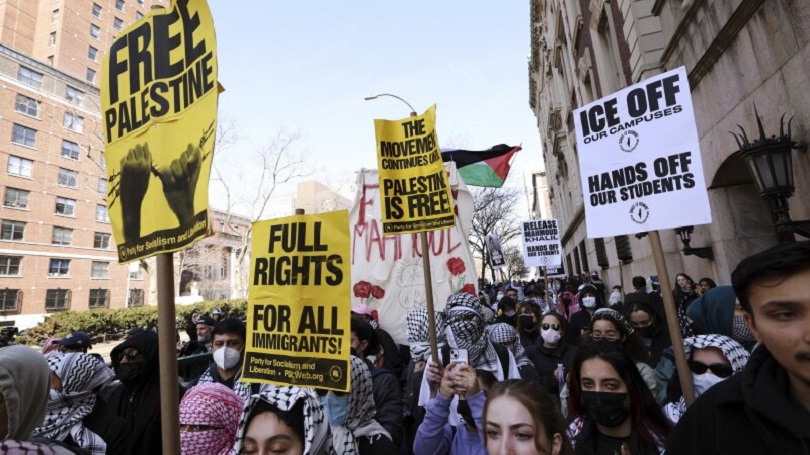KALAMAZOO, Mich. — Protesters in Kalamazoo, calling for an end to the war in Gaza, have voiced growing concern over the Trump administration’s recent efforts to target pro-Palestinian demonstrators. These concerns intensified after the detention of Mahmoud Khalil, a Columbia University student and activist, who was arrested earlier this month by Immigration and Customs Enforcement (ICE).
On Sunday, a small group of pro-Palestine protesters gathered in downtown Kalamazoo as part of their weekly demonstration. Among them was Marissa Wagner, president of Western Michigan University’s Students for Justice in Palestine. Wagner, who has been actively involved in the movement, said the arrest of Khalil came as a shock, particularly since the student was a permanent U.S. resident with a green card. ICE agents reportedly revoked his student visa and green card during his detention.
In light of Khalil’s arrest, Wagner said the pro-Palestinian activist community is adjusting its organizing strategy. She explained that international students with more secure immigration status are now stepping up to take on leadership roles to help shield those at risk from immigration crackdowns.
“We know that students from countries like Palestine, Lebanon, Sudan, and Congo have been brutally affected by this conflict. To have to live through that trauma, and then face the fear of being targeted for their activism, is unimaginable,” Wagner said. “We should be advocating for them, not placing the burden on them to defend themselves and their families.”
The arrest has sparked anxiety within the international student community, particularly among those at risk of losing their immigration status. Said Abubakr, a professor at Western Michigan University and a U.S. citizen since the 1990s, participated in the demonstration outside the federal building and U.S. courthouse. Although he does not fear for his own status, he expressed deep concern for his international students.
“Students are scared,” said Abubakr. “They’ve spent years building their academic careers and investing significant resources to get this far. They don’t want to jeopardize their education because of fear of deportation. It’s a difficult situation.”
Khalil’s detention coincides with an executive order issued by the Trump administration, which has pledged to detain and deport student activists who participated in campus protests sparked by the ongoing war in Gaza. In a post on Truth Social, former President Donald Trump stated that the arrest was just “the first of many to come.” He accused the student activists of engaging in “pro-terrorist, anti-Semitic, anti-American activity,” and promised to hold them accountable.
“We know there are more students at Columbia and other universities across the country who have engaged in these kinds of activities, and the Trump administration will not tolerate it,” Trump wrote.
Secretary of State Marco Rubio defended the administration’s actions, particularly Khalil’s detention, in a public statement on Wednesday. Rubio claimed that the behavior of some protesters was disruptive to academic environments, saying, “These lunatics are running around screaming terrifying things, and students can’t even go to class.”
Wagner, however, strongly rejected the characterization of Palestinian protesters as supporters of terrorism. She argued that their cause is rooted in a call for peace and human rights, not violence.
“We are advocating for an end to violence, for human rights, and for everyone’s right to self-determination,” Wagner said. “We are not supporting terrorism. We are calling for justice.”
In response to the crackdown, student activists at Western Michigan University organized a protest on Friday, demanding that the university administration adopt policies to safeguard students’ First Amendment rights. They believe that academic institutions must protect the right to free speech and assembly, especially when students are advocating for justice and peace.
The growing tension over free speech and activism is now raising questions about the balance between national security concerns and constitutional freedoms, especially as universities across the country prepare for potential future protests. As Kalamazoo protesters continue their fight for Palestinian rights, their concerns about the impact of the administration’s policies on student activism only seem to be intensifying.







